Echo Chronicles: Rank
by SealWyf, HSM team writer
There’s no denying it: the Homelings are a very large group.
We have just added our 33rd MotherShip clubhouse, which means we can house 1,056 Homelings. The number enrolled on our Fluidic Space website is about half of that. And the number who “suit up” and attend Homeling events and gatherings at least once a week is perhaps half of that number. But that’s still two to three hundred active members of the Collective — enough to max out a public space, or overflow a club during our weekly town-hall meetings. Any way you look at it, that’s a lot of Homelings.
One of the questions we get from other groups is how we manage so many members. “We are Many, we are One” is more than a slogan — it’s an accurate reflection of the simultaneous diversity and unity of the Homeling Collective. No one factor can explain our success. In my previous articles, I have described the visual unity of the Homelings maintained by our dress code, our love of public spectacle, and the peculiar institution of the “Klent”. Today I examine another face of Homeling culture: our ranks.
The Collective was founded by a military man — buddy118, affectionately known as Mother. Given that ancestry, it is not surprising that Homeling ranks mimic military structure. However, the correspondence is more symbolic than real; the actual governance of the Collective is not particularly authoritarian. There are not many questions for which the accepted answer is “Because I’m a General, that’s why!” In fact, the only one I can think of offhand, is “Why are you wearing black?”
If I had to give a name to our organizational system, I would describe it as “chaotic consensus, with occasional strong suggestions.” No real military group could be run that way. Rambling forum discussions and rowdy town-hall meetings don’t mesh with a chain of command. But these things work quite well for Homelings.
What follows is simplified. I’m leaving out the Representatives, the Prospects, the Chief Subcommanders, the Elders, and the unique rank of the Homeling Cogniscienti. These ranks are important, and they give our Collective its unique personality. But including them would obscure our basic three-layer structure: Subcommander, Commander and General.
The lynchpin of the Homeling rank system is the Commander. This rank springs directly from Home’s club implementation. In Home, each Clubhouse has one Owner and up to four Sub-owners. And so, each Homeling MotherShip is based in a Clubhouse run by one Commander and up to four Subcommanders. New Homelings (“Newlings”) are assigned to a MotherShip; the Commander notes their arrival in his or her MotherShip log on our Fluidic Space website, giving us some handle on the perennial question: “How many Homelings are there, anyway?”
Above the Commanders, are the Generals. Here, the military analogy breaks down — there is no direct chain of command. That is, specific Generals are not responsible for specific Commanders. The Generals’ Council is simply an oversight committee with shared organizational and ceremonial functions. Most of the Generals are also Commanders, in charge of their own MotherShips.
Specific Generals manage shared resources, such as the Fluidic Space website or the public information wiki. But the main function of the Generals’ Council is to discuss, to delegate, to encourage, to moderate knotty personnel issues, to put in an appearance (in or out of fancy black dress uniforms), and to serve as cheerleaders for the Collective. We do most of our work by building consensus. “Strong suggestions” are only rarely required.
In general, each rank is responsible for the selection and promotion of the rank beneath it. Subcommanders are expected to recruit and Assimilate new members for their ship. Commanders recruit, train and promote Subcommanders. Generals review applications for Commander, and promote those who are ready for the responsibility of running a MotherShip. The Generals also appoint other Generals, through the process of “chaotic consensus”. Though slow, this process can be surprisingly effective.
All Homeling officers, Subcommanders through Generals, are encouraged to attend the weekly Command Central administrative meetings, which are held in a clubhouse set aside for that purpose. This is where “chaotic consensus” reaches its true glory. The meeting is moderated by one of the Generals, and another officer takes minutes. Anyone who wishes to speak stands at attention and waits to be called. The meeting structure is simple, and frequently dissolves into silliness. Each meeting ends in dancing. Discussion continues in the comments to the minutes, which are posted on the website.
It’s a simple organization. And, like many simple things, it can be surprisingly effective. In the year and a half that I’ve been Homeling, I’ve seen the Collective add about a dozen MotherShips and a few hundred members, all with very little change to the basic three-layer Command structure. A fourth layer was briefly tried, and then discarded. Three layers are stable; this structure can be scaled up to manage a much larger organization than we will have for many years to come.
That’s not to say it has no problems. Thirty-two members may be a decent size for a basic clubhouse, but it’s way too small for a meeting or party space. We have already reached the point where not all MotherShip Commanders can attend Command Central at the same time. And that’s not counting Subcommanders, who have to apply early to get a seat at the meeting. This issue will only grow as we add more MotherShips. It’s my hope that Sony will someday introduce a “super-club” that can accommodate at least 64 members.
A more serious problem is that of attitude. Despite our alien good looks and sci-fi accessories, we are all, underneath, human. More to the point, we are gamers. And gamers are eager to “rank up”.
If Home and Homelings are games (and I would argue that they are), they are not traditional ones. We’ve all played role-playing games: a teenage boy from a small village starts at Level 1. After many adventures, the hero, now at Level 99, is ready to confront the Big Boss and see the final credits. It’s a simple system, whatever choices and complications the game designers may have added. And it’s enough like real life that we find it satisfying. We all start out as children, gaining rank and experience as we progress through the world, and confronting bigger challenges.
But real life is never that simple. Most of don’t get to confront the Big Boss, or even become one. We set our own goals, and some of us reach them. For others, the final credits appear too soon. This is why we prefer game to reality. In the gaming world, when we hit Game Over, we restore from a save point and play again until we get it right.
But the virtual world of the Collective is more like real life than most games. In a game, ranking up is usually “more of the same.” There’s not that much difference between a Level 20 Mage and the same mage at Level 30. But very different skills are required for Subcommanders and Commanders. Generals have yet another skill set. Not everyone who enters the Collective will make General, or even Commander. And some perfectly glorious Representatives never advance to Subcommander.
Rank is not an automatic reward for time served or enthusiasm. The good of the Collective comes first. For officers at all levels, saying “no” to sincere ambition is one of our hardest duties.
I would be less than honest if I did not admit that ranking up has given me pride and pleasure. Indeed, becoming a Homeling General was as satisfying as many of my real-world successes and promotions. Every day, I try to deserve the honor that has been given me. I wish everyone could share this joy of achievement.
But if Home and Homelings are games (and I still maintain they are), they are games with non-traditional rules. And, though we are still writing the rules, one thing is clear: Homelings, despite its role-play elements, is not a role-playing game. It’s more of a team sport. The goal of the player is not individual success — it’s finding a way to contribute to the success of the group.
The goal is making a difference. Every Homeling, from the newest Newling to the hoariest Elder, can make a difference. Every Homeling can make Homelings greater. Some are suited to rank, yes. Others excel at planning events, at recruiting, at creating new ideas, or just at being a good friend. All Homelings are valued.
We are Many. We are One. Each of us is worthy. Each of us is a voice in the chorus of Home.
Our founder, Mother, says: We built this. To which I add, We are still building it. We are the Collective: Newling and Representative, Prospect, Subcommander and Commander, General and Elder, Cogniscienti and Mother. The Oracle, now vanished. The Sentinels, now discontinued. Those who left, and those who have returned. We are all in this together.
We are the Collective. We are still building this. We are still discovering the rules. We are still learning who we are.
Rank is important, yes. But rank is simply a tool — one way to make something new and vibrant in this place, this game, this Home. There are others tools, other paths. All are valued.
We are the Collective.
We are Many, but also we are also One.
Together, we are glory.


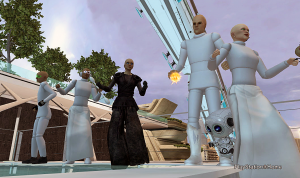
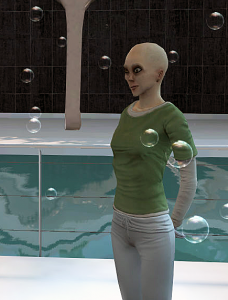
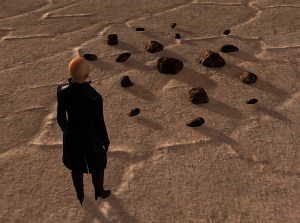
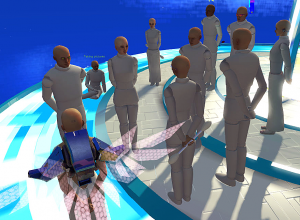
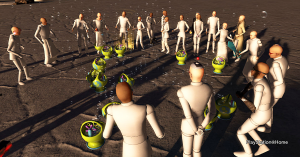

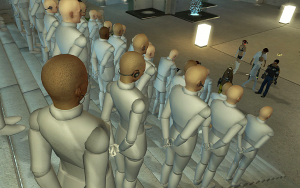

Downplaying the virtues of the individual for the “greater good” of the group sounds rather Communistic to me so I must ask:what prevents the upper ranks from using the “collective” for purposes of personal or individual gain to prevent a Stalin-style take-over?What I’m asking specifically,is there some kind of group/tribunal/committee that decides whether or not an individual of the upper ranks has placed their own good over that of the good of the whole group?Just curious about who ensures that the rules are being followed because in most groups I know of and in my own organization there is a person or small group of people at the top that make that decision.So unless there is a group/person that does this or a vote of all members to decide these questions I’m not sure how “conformity” to the founding principals of the group can be maintained.
Homelings a Communist front? Well, we are a Collective — or, as I described it above, a “team sport”. The old football motto, “There is no ‘I’ in ‘Team'” could be seen as a Communist trope, I suppose. Group-mindedness comes in many forms, not all of them sinister.
As to who keeps the Generals honest — I would have to say that the Generals keep each other honest. One of the main qualifications for that rank is the wholehearted support of the ideals of the group. Any being who was looking for personal glory would either not have joined Homelings in the first place, or would likely leave before they achieved high rank.
And, even if the entire GC suddenly became corrupt, what would it avail them? There’s not much money involved — we scramble to pay the rent on the website. And our real-world power is nil. The only thing we’re getting out of this is personal satisfaction. And we get a lot more of that by adhering to our ideals than by flouting them.
Well seal there could be many different motivators for someone or a small group to try a take-over.The most obvious 1 to me,as I’ve seen it in action numerous times in other organizations,is the good old-fashioned “power trip” where 1 person or a small group within a larger group start a “clique”(if it’s a group) or if a single person starts a “cult of personality” and starts to force those that won’t comply to their viewpoints out in order to be in total control of the group.By saying Homelings sound Communistic I didn’t mean anything other than that it sounded to me as they downplay the individual and individual abilities and promote the group and things that benefit the whole.I only brought up Stalin because if you really read into how he took control of the Soviet-Union(before the exiling and executions started)it shows how 1 person can take-over an entire group with nothing more than words and a few rigged elections.Some people crave the adulation of others(yes even in a virtual world and even if that adulation isn’t freely given)and I was just wondering what fail-safes the Homelings had against that.It SOUNDS to me as though they rely on the Generals to make sure this doesn’t occur,if so then the selections of their Generals should be taken with the utmost care,as the selection of any organizations “Guardians of concept conformity” should be.Thanks for answering my question SealWyf,I realise it’s a more detailed 1 than the usual question I’d ask but the inner workings of Home organizations is a topic that interests me greatly.
No offense taken, Cthulu. I enjoy our conversations. And I do realize that even a group as immaterial as the Homeling Collective can generate a real-world sense of power, status, and accomplishment in its officers. Like you, I find the inner workings of virtual life profoundly interesting. Are the Homelings less real than, say, the Masons because they exist on a networked gaming console? I don’t think so. Sharing physical space is not as important as we assume.
It’s funny you should mention the Masons,on the Sony Forum there was a topic on “fams” and 1 person went on and on about how bad they were but at the end it had something like”I love my Playstation and I’m a Mason”(I know it was something slightly different but I forget exactly what it was).So I asked this person to describe the differences in these role-playing organizations that make 1 “good” and the other not so.I never did get an answer but,like you,I see no fundamental difference between the two other than actual physical presence and while I don’t want to say physical presence isn’t important it is something that can be worked around.
I have been in Homelings for about a year now. The whole concept of ‘rank’ in the group has never affected me. It seems to be about accepting responsibilities for specific projects and activities rather than bossing people around. The real reason most of us join -- and never seek any higher ranks -- is because the others are doing such a great job of planning, organizing, and implementing “fun” things to do.
To me, calling SealWyf a General is appropriate: she works herself to the bone doing things to keep the Homelings as great group for a good time. And you can call me a Newling forever because I am one of those lazy members who just shows up to party!
Now I’m confused Granny.is effort the sole determination when it comes to advancing people to the rank of General?
Nope. It doesn’t hurt, but the real criterion is, “Is this a voice we need on the Council?”
There’s your answer, Cthulu: I don’t have the free time to really be of much use on committees but I have great admiration for those Homelings who do. And I would be a total loss as a voice on the Council since the only thing I ever ask is “When’s the next party?” So I get to enjoy all the FUN that Homelings are dedicated to while resting my lazy butt in this chair.
Keara is also busy presenting her unique voice on HomeStation Magazine.
That answers my effort question but my original question about how the Homelings prevent being taken over by inner corruption is only indirectly answered.I realize I may be asking for insider information that the group would rather not have made public(many groups have that view) but I must ask.In my own organization,I make these decisions about what is best for the organization with input from my top ranked people.I can agree with them or not and the final decision is mine to make so it’s sort of like a dictatorship,albeit a benevolent one,I formed it this way to cut down on internal power struggles as deposing me would so fundamentally change the face of the group that it would no longer be able to exist as it is now.In effect successfully taking it over would destroy the group and would make it necessary to start over by all involved.Many groups use a small group of people to make judgements about whether a member has acted within the bounds of the groups rules.This is what I was basically asking,who decides(or if not a who what)if a top ranked member has attempted a take-over or have somehow committed other serious offenses.The idea of a collective to me would mean everyone would have to vote on the question but I have no idea how this actually works with the Homelings,which is why I ask.Like I said though,I realize this may be info. not for public use and have no problem what-so-ever if the question never gets answered.